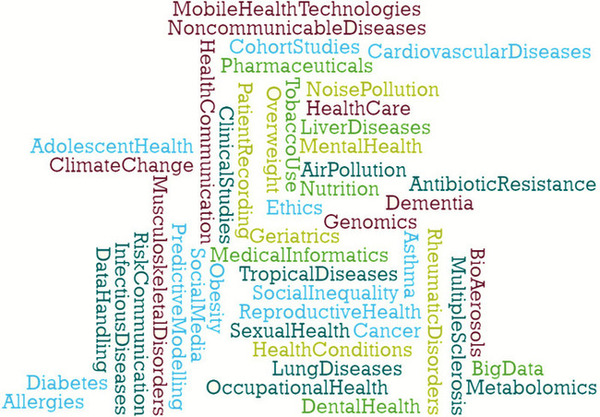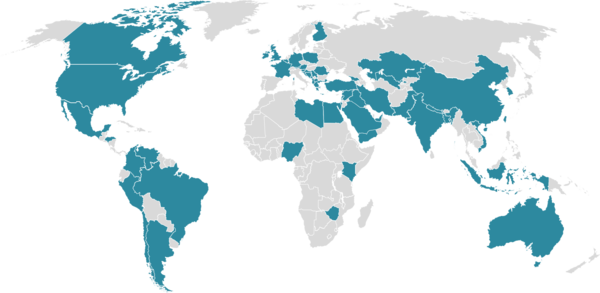Curriculum
Our master’s programme in Epidemiology offers students the chance to learn how to analyse different problems in health-related fields and how to plan, execute, and interpret studies. Over the course of two years, students learn about the relationships between diseases and the risk factors that lead to ill-health as well as how to recognise diseases trends, to apply health prevention and promotion approaches, and to determine the prognostic value and the influence of therapeutics on patient quality of life. Students also study the relationship between diseasaes, an individual’s genetic predisposition, and influential environmental factors. In the second and third semester students gain practical experience through two mandatory internships.
The programme is structured in accordance with the Bologna Process. A total of 120 ECTS credits must be acquired over four semesters. All lectures, courses and seminars are held in English. In the electives, students also have the opportunity to choose courses in German from the Public Health master's programme.
Curriculum and module overview
Hover over ⓘ for more information on the modules.
Legend: grey = Core Module; blue = Specialisations and Electives; green = Electives from M.Sc. Public Health (Electives from M.Sc. Public Health can be selected for M.Sc. Epidemiology - and vice versa; modules in M.Sc. Public Health are commonly held in German)
| 1. Semester 32 ECTS | 2. Semester 28 ECTS | 3. Semester 30 ECTS | 4. Semester 30 ECTS | |||
|---|---|---|---|---|---|---|
| ⓘ Epidemiology and Research Design (6 ECTS) | ⓘ Health Services and Research (4 ECTS) | ⓘ Internship II (12 ECTS) | ⓘ Master thesis (30 ECTS) | |||
| ⓘ Quantitative Methods (6 ECTS) | ⓘ Internship I (12 ECTS) | |||||
| From Concept to Analysis | Health Geography: GIS and Geospatial Methods (3 ECTS) | Research Skills | ||||
| Research Skills (2 ECTS) |
ⓘ Health Communication (6 ECTS) |
|||||
| ⓘ Nutritional Epidemiology (3 ECTS) |
||||||
| ⓘ Applied Statistics in Epidemiology (6 ECTS) | ||||||
| Specialisation (18 ECTS) Epidemiology Clinical Epidemiology Environm., Occup., Radiat. Epidemiology Genetic Epidemiology Advanced Biometry |
Specialisation (18 ECTS) Epidemiology Clinical Epidemiology Environm., Occup., Radiat. Epidemiology Genetic Epidemiology Advanced Biometry |
|||||
| ⓘ Prevention and Health Promotion (12 ECTS) | ||||||
| ⓘ Health Services Research and Health Economics (12 ECTS) | ||||||
| ⓘ Social and Behavioural Science (6 ECTS) | ||||||
| ⓘ Global Public Health (9 ECTS) | ||||||
| ⓘ Qualitative Methods (6 ECTS) | ||||||
| ⓘ MeMPE University (3 ECTS) | ||||||
| ⓘ Public Mental Health (3 ECTS) | ||||||
| ⓘ Health Care Research (3 ECTS) |
Internship
Two mandatory internships (each 12 ECTS) will be conducted in the second and third semester of the master's programme in Epidemiology. The internships should give a concrete insight into the fields of epidemiology. Students get to know various institutions in the field, are actively involved in their work processes (field work, conceptual tasks, data collection, etc.) and projects and work on specific topics in order to gain relevant practical experience prior to graduating.The internship positions are offered by cooperating research institutions and organisations. If students are looking for an internship position independently, this will be encouraged and supported. It is possible to complete the internship at domestic or foreign institutions (e.g. Pettenkofer School of Public Health, Helmholtz Center, LGL, OECD, WHO etc.).

Exemplary internship topics from 2014-2019
International
Approximately 75% of our students are international, leading to an overall environment students enjoy and ultimately benefit from. Further international exchange is possible by completing the internships abroad as well as taking an additional semester abroad via "Erasmus+". In the case of a stay abroad, various scholarships and funding opportunities are presented for which students can apply.

Our students’ home countries in recent years (as of August 2020)
With regard to a semester abroad via "Erasmus +", there are currently collaborations in the Epidemiology department with the following universities:
- Université de Bordeaux / France (courses in French)
- Latvijas Universitáte (Riga) / Latvia (courses in English)
- Universidade do Porto / Portugal (courses in English)
- Lunds universitet / Sweden (courses in English)
- Uppsala Universitet / Sweden (courses in English)
- Universität Luzern / Switzerland (courses in English)
More information about the Erasmus programme at LMU Munich can be found here.
Additionally, there are various programmes and some funding opportunities at the Medical Faculty and LMU Munich.
EUGLOH – European University Alliance for Global Health
In association with the universities of Paris-Saclay (France), Lund (Sweden), Porto (Portugal) and Szeged (Hungary), the LMU has successfully applied to set up an European university network. During the coming three years, the "European University Alliance for Global Health" (EUGLOH), will develop interdisciplinary activities, particularly in the area of education and training relating to the topic of global health. The five universities from different regions of the European Union complement each other in their expertise from a wide range of different subject areas, which will contribute to the overarching theme of the alliance “Global Health”. From 2021 on, the “European Network Universities” will be expanded further as part of the new Erasmus program. Further information on EUGLOH can be found here.

